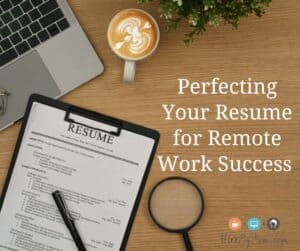Perfecting Your Resume for Remote Work Success

We often share tips for resumes and other application materials that encompass: customizing your materials for each application you submit, mentioning your past work history, etc. While these are all great tips, we wanted to share some new ones that will help you create eye-catching resumes.
Seek Online Sources of Inspiration
Start by exploring online resources that can help shape your resume for remote work. Numerous websites offer professional resume examples tailored to various industries, providing a great starting point. Platforms like LinkedIn are invaluable; you can analyze profiles of successful professionals in your field to see how they present their skills and experiences. Pay particular attention to how these profiles highlight skills crucial for remote work, such as self-motivation, time management, and proficiency with technology. These elements can guide you in structuring your own resume.
Additionally, look for resume templates specifically designed for remote jobs. These templates often emphasize key areas that remote employers value, helping you focus on the most relevant information. You might also find articles and forums where people discuss their experiences and share advice on crafting resumes that stand out to remote employers. This collective knowledge can offer fresh perspectives and tips you might not have considered.
Another valuable source of inspiration can be online courses or webinars on resume building and job searching. Many of these are tailored for the digital job market and can provide up-to-date insights and strategies. Incorporating advice from these experts can ensure your resume is current and compelling. The key is to use these resources to create a resume that highlights your suitability for remote work. In fact, we offer a great course that can help you called Cultivate!
Add Visual Elements
Recruiters often sift through a large number of applications, so your resume needs to grab their attention quickly. Adding visual elements like charts and graphs can effectively showcase your skills and accomplishments. For example, a skills chart can illustrate your proficiency in various areas, providing a quick visual snapshot of your capabilities. Given that nearly a quarter of hiring managers spend under 30 seconds skimming a candidate’s resume (24% of them, in fact), having these visual cues can make a significant difference. By creatively incorporating visual aids, you can highlight your strengths in a way that stands out and leaves a lasting impression.
Stay True to Yourself
Your resume should go beyond listing professional skills and job titles; it should also offer a glimpse into who you are as a person. Showcasing hobbies, volunteer activities, or personal projects can add depth and dimension, giving hiring managers a fuller picture of your capabilities and character. For instance, if you’re involved in community service, it might highlight your teamwork and leadership skills. Personal projects, like a blog or a coding portfolio, can illustrate your passion and self-motivation, key traits for remote work.
Incorporating elements that reflect your personality doesn’t mean sacrificing professionalism. Carefully select activities and interests that resonate with the role you’re applying for and that demonstrate qualities beneficial for remote work. For example, if you’ve taken part in an online course or workshop related to your field, mentioning this can show your commitment to continuous learning.
If you have a personal website, blog, or portfolio, consider including a link in your resume. A professional website can offer a deeper dive into your work and personality, providing a more comprehensive view of your skills and experiences. You might even add a video introduction, allowing hiring managers to see and hear from you directly, creating a more personal connection even before the interview stage.
Offer Concrete Data
When detailing your achievements, use specific numbers and evidence to back up your claims. For example, if you improved a process at your previous job, describe the percentage increase in efficiency and provide supporting documents like project reports or performance reviews. If you managed a team, mention the team size and any measurable outcomes, such as a rise in productivity or reduced turnover rates. Highlighting your technical expertise and job-specific skills is crucial, as 88% of full-time hiring managers prioritize these attributes during the hiring process. If you contributed to a significant project, describe your role and its impact, supported by concrete data. For instance, “Spearheaded a marketing campaign that increased website traffic by 40% over six months.”
Using quantifiable metrics not only showcases your contributions but also provides a clearer picture of your capabilities to potential employers. For example, if you are a marketer, you can provide links to posts that went viral so companies can have a better understanding of the work you produce.
Rehearse With Friends
One often overlooked aspect of resume preparation is the importance of feedback and rehearsal. After crafting your resume, share it with friends and family for their honest opinions. They can spot inconsistencies, unclear statements, or areas that need more detail. Additionally, they can provide insights into how well your resume reflects your suitability for remote work.
Beyond written feedback, consider conducting mock interviews with them. This practice can be invaluable, allowing you to articulate your experiences and skills effectively. Encourage them to ask questions that a potential employer might pose, particularly those related to remote work dynamics, such as how you manage your time, handle communication, and stay motivated. This not only boosts your confidence but also helps you refine your answers, making you more prepared for the actual interview.
Another benefit of rehearsing with friends is the opportunity to practice discussing your concrete achievements and the data supporting them. Ensure that you can fluently explain how your previous roles and accomplishments align with the demands of remote work. For instance, if your resume mentions a project that significantly improved team efficiency, be ready to discuss your specific contributions and the impact in detail.
We also offer resume building and interview training with our HR experts. Start with your family for some feedback, then contact our experts!

